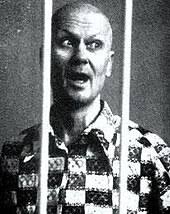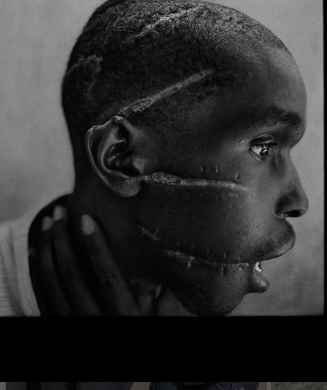Serial killer Andrei Chikatilo demonstrates murdering one of his victims for police. Chikatilo was convicted of killing 52 people over a 12-year span. On Valentine's Day 1994, officials took Chikatilo to a soundproof room and executed him by pistol.
Andrei Chikatilo, (born October 16, 1936, Yablochnoye, U.S.S.R. [now Ukraine]—died February 14, 1994, Moscow, Russia), Soviet serial killer who murdered at least 50 people between 1978 and 1990. His case is noteworthy not only because of the large number of his victims but because efforts by Soviet police to issue warnings to the public during their investigation were hampered by the country’s official ideology, which asserted that serial murder was impossible in a communist society.
Chikatilo grew up in the aftermath of the great Ukrainian famine of the 1930s, during which millions of people died and many resorted to cannibalism to survive. During his childhood, he was told constantly by his mother that he had an older brother who had been kidnapped and eaten by neighbours. The story, which cannot be verified, apparently motivated Chikatilo to cannibalize some of his victims. Chikatilo was an avid reader with a particular interest in stories that described how German prisoners were tortured by their Soviet captors during World War II.
After completing his military service, Chikatilo became a telephone engineer near Rostov-na-Donu, where he married in 1963. In 1971 he received a degree from Rostov Liberal Arts University and became a teacher. He was forced to resign his position, however, after some parents complained of sexual assaults by Chikatilo on their children.
Chikatilo began his killings in 1978, preying on young victims whom he met at rail stations and bus depots around Rostov-na-Donu and other cities to which he traveled in his various jobs. Because all the victims displayed characteristic mutilations, the police soon became aware that a serial killer was active in the region. Nevertheless, Chikatilo was able to evade detection for many years, in part because his crimes exploited weaknesses in the decaying society of the Soviet Union. Poverty made young people eager to leave their homes for the city, but, since they often had no friends or contacts there and little money, they could easily be lured into dangerous situations, and their disappearances would often go unnoticed.
In 1984 Chikatilo was arrested by a police officer who witnessed him molesting a girl at a train station. Although the briefcase he was carrying was found to contain a long knife and other suspicious instruments, police misidentified his blood type, which their tests showed did not match the type indicated by semen found at one of the crime scenes. Chikatilo was subsequently charged with theft of materials from a former employer and sentenced to one year in prison, though he was released after three months.
After his release Chikatilo resumed killing, and the subsequent police investigation, which included 24-hour surveillance of bus and train stations in one district, was intensive. In 1990 he was identified as the chief suspect in the crimes and arrested; at the time of his arrest, he was carrying a briefcase containing items similar to those in his possession when he was detained six years earlier. While in custody, Chikatilo confessed, and later he was transported to various crime scenes to demonstrate his methods to police. Convicted of 52 murders and sentenced to death, he was executed in a Moscow prison. Citizen X, a television movie based on Chikatilo’s life, was aired in 1995.
Hear Professor Robert Hanlon discuss a brutal homicide case described in his book Survived by One: The Life and Mind of a Family Mass Murderer
Hear Professor Robert Hanlon discuss a brutal homicide case described in his book Survived by One: The Life and Mind of a Family Mass Murderer
Robert Hanlon, a neuropsychology professor at Northwestern University, discussing the case of a man who was convicted of murdering his parents and three siblings in 1985. Hanlon was inspired to write Survived by One: The Life and Mind of a Family Mass Murderer (2013), about the contributing causes to the brutal crime, after the killer reached out to Hanlon in 2003.
See all videos for this article
Homicide, the killing of one human being by another. Homicide is a general term and may refer to a noncriminal act as well as the criminal act of murder. Some homicides are considered justifiable, such as the killing of a person to prevent the commission of a serious felony or to aid a representative of the law. Other homicides are said to be excusable, as when a person kills in self-defense. A criminal homicide is one that is not regarded by the applicable criminal code as justifiable or excusable. All legal systems make important distinctions between different types of homicide, and punishments vary greatly according to the intent of the killer, the dangerousness of the killer’s conduct, and the circumstances of the act.
Anglo-American codes classify homicides into two or more separate crimes, each crime carrying its own penalty, which can be varied within limits by the sentencing authority. Thus, murder is a homicide committed intentionally or as a result of the commission of another serious offense. The crime of manslaughter includes killings that are the result of recklessness or a violent emotional outburst, as might result from provocation. Penalties for murder may include capital punishment or life imprisonment, whereas the penalty for manslaughter is usually a maximum number of years in confinement.
European codes and their derivatives group all unjustified killings under the single crime of homicide but specify different penalties depending on the circumstances of the act. Some countries provide special penalties in unique situations in accordance with special social needs. For example, Japan reserves its harshest penalties for the murder of one’s own lineal descendents, and Italy allows for mitigated punishment if killers acted from a sudden intense passion to avenge their honour. European codes, like Anglo-American codes, distinguish between intentional and other felony murders on the one hand and reckless, negligent, and provoked murders on the other. In all systems the most important distinction relevant to sentencing is that between conduct that is socially dangerous and conduct that is merely reckless (i.e., between acts of intent and acts of passion).
Anglo-American systems require an element of intent, or malice aforethought, in the act of murder. This includes “transferred intent”—as when one who intends to kill another kills a third person by mistake—and intent that may be inferred from the extreme recklessness or dangerousness of the act. Indian law requires that offenders know of the danger they might cause and thus rules out reckless acts that are the result of ignorance, but other jurisdictions are less clear on this point. Many U.S. states distinguish between murder of the first and of the second degree, with capital punishment limited to crimes of clear intent.
European civil-law codes place a greater emphasis than do common-law systems on the dangerousness of the actor’s conduct and the circumstances surrounding the act. Thus, bodily injury resulting in death and death that is a result of negligence rather than recklessness are more heavily penalized in European than in Anglo-American systems. Whereas in England death resulting from a felony is defined as murder only in the case of a few serious crimes, such as robbery or rape, European codes often punish any killer as a murderer if the culprit has employed a deadly weapon.
Unlike the provisions of most law codes in the Western world, murder under Islamic law is generally treated as a civil infraction—although Muslim jurisprudence does not clearly distinguish between civil and criminal law. Under traditional Islamic law, the family of a murdered Muslim is given the choice of taking retribution (Arabic: qiṣāṣ), which allows them or their proxy to take the murderer’s life, or accepting wergild (Arabic: diyah), or compensation, from the killer or the killer’s family. The Islamic tradition extols the latter, and, in the case of an accidental death, financial compensation by the offending party (in addition to an act of contrition) is the sole remedy.
During the 1990s the legal definitions of homicide in the West changed somewhat as a result of new attitudes toward the elderly and the terminally ill. Traditionally, European codes acquitted a person for a “mercy killing,” whereas Anglo-American codes did not, but in the 1990s a widespread “right to die” movement in North America and Europe sought the legalization of certain forms of euthanasia and physician-assisted suicide. In 1997 physician-assisted suicide was legalized in the U.S. state of Oregon, and in 2000 the Netherlands became the first country to enact a national law providing physicians with immunity from prosecution for mercy killings.
.

.jpeg)


.jpg)

%20(16).jpeg)
.jpg)
.png)

Comments
Post a Comment